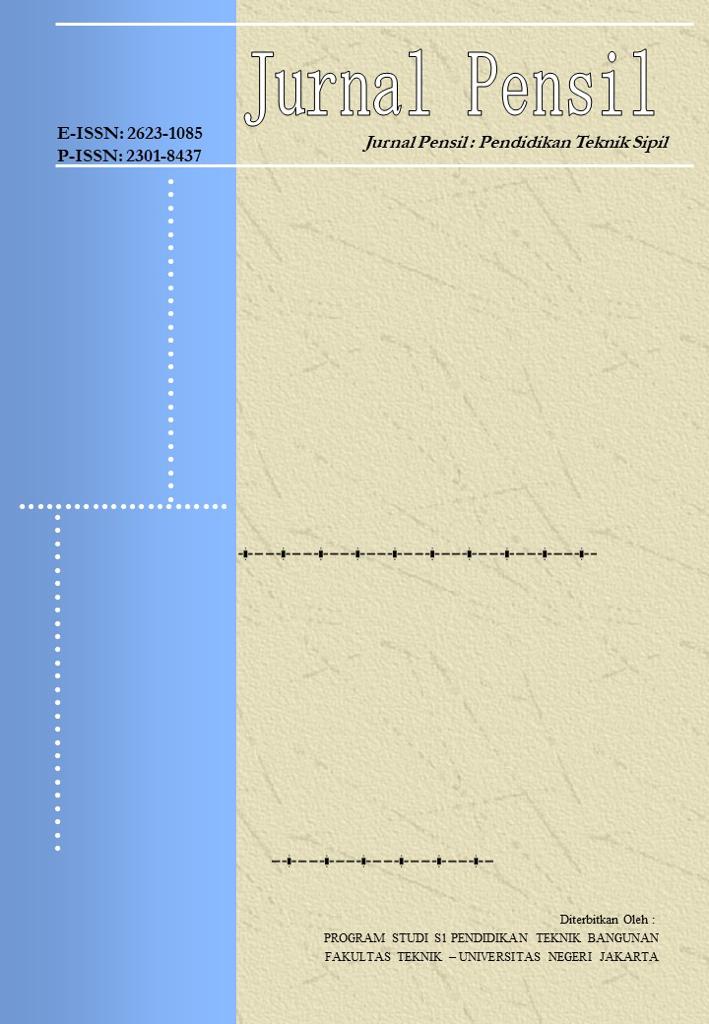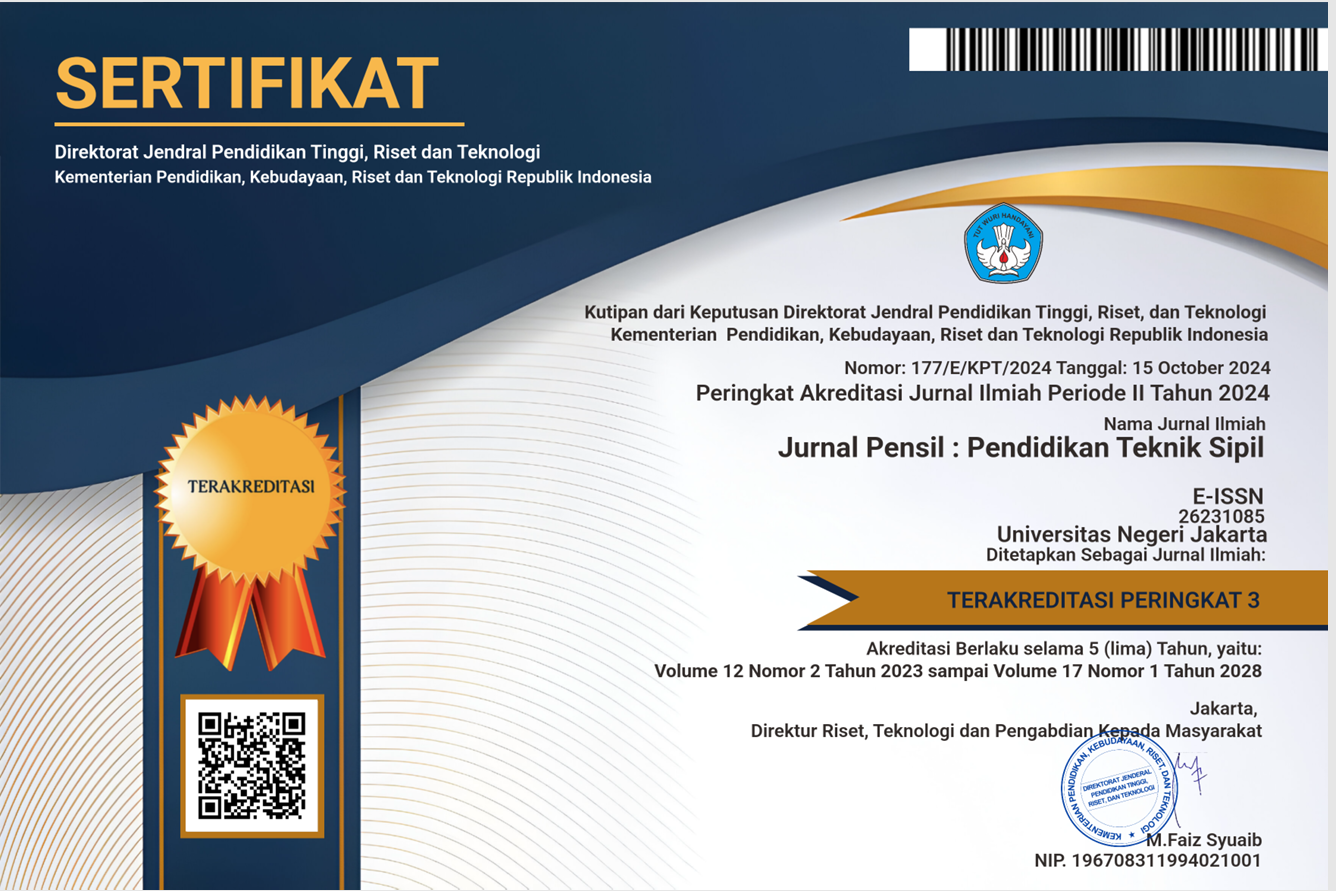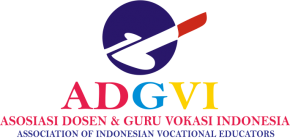THE CAREER ADAPTABILITY POTENTIAL OF VOCATIONAL HIGH SCHOOL STUDENTS FROM A DIGITAL LITERACY PERSPECTIVE
Keywords:
Career Adaptability, Digital Literacy, Vocational High School StudentAbstract
The dynamic career world always raises a new career problem, especially now in the era of the industrial revolution 4.0 and society 5.0. Prospective job seekers, especially vocational high school students, must be able to adapt and have the skills to face career challenges in the digitalization era and achieve success in the school-to-work transition phase. This study aims to examine how the potential for career adaptability of vocational high school students is from a digital literacy perspective. This research method uses a descriptive correlational quantitative approach using the Career Adapt-ability Scale (CAAS) instrument developed by Savickas. This research was conducted on 534 students of class XII and XIII of SMKN 5 Bandung in the Academic Year of 2021-2022. The research findings show that digital literacy ability has a significant positive relationship to students' career adaptability with a correlation coefficient of 0.528, at a moderate level of relationship and the results of the analysis of the coefficient of determination show that digital literacy contributes 27.9% to career adaptability. This proves that digital literacy skills have a relationship and contribute to the potential adaptability of students' careers in facing career challenges in the 4.0 era.
References
Andersen, P., & Vandehey, M. (2011). Career Counseling and Development in A Global Economy. Belmont: Cengage Learning.
Annisa, Kusdaryani, W., & Hartini, T. (2021). Hubungan Kemampuan Literasi Digital dengan Perencanaan Karir Siswa SMA PGRI Kragilan Kabupaten Serang. Jurnal Pendidikan Dan Humaniora, 1(3).
Badan Pusat Statistik. (2021a). Pengangguran Terbuka Menurut Pendidikan Tertinggi yang Ditamatkan Tahun 2021 - 2022. Diakses dari.
Badan Pusat Statistik. (2021b). Tingkat Pengangguran Terbuka Berdasarkan Tingkat Pendidikan 2019-2021. Diakses dar:
Brown, S. D., & Lent, R. W. (2012). Career Development and Counseling: Putting Theory and Research to Work (2nd ed.). New Jersey: John Wiley & Sons.
Cabras, C., & Mondo, M. (2018). Future orientation as a mediator between career adaptability and life satisfaction in university students. Journal of Career Development, 45(6), 597–609.
Chan, S. H. J., & Mai, X. (2015). The Relation of Career Adaptability to Satisfaction and Turnover Intentions. Journal of Vocational Behavior, 89, 130–139.
Chong, S., & Leong, F. T. L. (2017). Antecedents of Career Adaptability in Strategic Career Management. Journal of Career Assessment, 25(2), 268–280.
Creed, P. A., Fallon, T., & Hood, M. (2009). The Relationship Between Career Adaptability, Person and Situation Variables, and Career Concerns in Young Adults. Journal of Vocational Behavior, 74(2), 219–229.
Elpira, B. (2018). Pengaruh Penerapan Literasi Digital terhadap Peningkatan Pembelajaran Siswa di SMP Negeri 6 Banda Aceh. (Disertasi). UIN Ar-Raniry: Banda Aceh.
Ferreira, N. (2019). Enhancing career wellbeing: The role of workplace friendship, career adaptability and organisational commitment. Theory, Research and Dynamics of Career Wellbeing, 197–216.
Firdaus, Z. Z. (2012). Pengaruh Unit Produksi, Pengalaman Prakerin dan Dukungan Keluarga terhadap Kesiapan Kerja Siswa SMK. Jurnal Pendidikan Vokasi, 2(3).
Ganapathy, M., & Kaur, S. (2015). Using Beetham and Sharpe’s (2011) Model in Analysing The Digital Literacy Practices of ESL Students in An Institution of Higher Learning. Malaysian Journal of Languages and Linguistics (MJLL), 4(1), 31–42.
Gunawan, W., Siahaan, F. M. M., Indianti, W., Seniati, A. N. L., & Suharso, P. L. (2013). Pengaruh Sumber-Sumber Efikasi Diri Karier dan Efikasi Diri Pengambilan Keputusan Karier terhadap Adaptabilitas Karier Remaja: The Influence of Sources of Self-Eficacy and Career Decision Making Self-Efficacy to Adolescent Career Adaptability. (Tesis). Fakultas Psikologi, Universitas Indonesia, Depok.
Gunkel, M., Schlaegel, C., Langella, I. M., & Peluchette, J. V. (2010). Personality and Career Decisiveness: An International Empirical Comparison of Business Students’ Career Planning. Personnel Review, 52(1), 43–55.
Hamid, F. (2010). Kamus Ilmiah Populer Lengkap. Surabaya: Apollo.
Healy, C. C. (1982). Career Development: Counseling Through The Life Stages. Los Angeles: Allyn & Bacon.
Hirschi, A. (2009). Career Adaptability Development in Adolescence: Multiple Predictors and Effect on Sense of Power and Life Satisfaction. Journal of Vocational Behavior, 74(2), 145–155.
Hirschi, A. (2010). Swiss Adolescents’ Career Aspirations: Influence of Context, Age, and Career Adaptability. Journal of Career Development, 36(3), 228–245.
Hirschi, A., Herrmann, A., & Keller, A. C. (2015). Career Adaptivity, Adaptability, and Adapting: A Conceptual and Empirical Investigation. Journal of Vocational Behavior, 87, 1–10.
Irhandayaningsih, A. (2020). Pengukuran Literasi Digital pada Peserta Pembelajaran Daring di Masa Pandemi Covid-19. Jurnal Kajian Budaya, Perpustakaan Dan Budaya, 4(2), 231–240.
Koen, J., Klehe, U.-C., & Van Vianen, A. E. M. (2012). Training Career Adaptability to Facilitate a Successful School-to-Work Transition. Journal of Vocational Behavior, 81(3), 395–408.
Koen, J., Klehe, U.-C., Van Vianen, A. E. M., Zikic, J., & Nauta, A. (2010). Job-Search Strategies and Reemployment Quality: The Impact of Career Adaptability. Journal of Vocational Behavior, 77(1), 126–139.
Law, N., Woo, D., & Wong, G. (2018). A Global Framework of Reference on Digital Literacy Skills for Indicator 4.4.2. Montreal: UNESCO.
Levine, K. J., & Aley, M. (2022). Introducing The Sixth Source of Vocational Anticipatory Socialization: Using The Internet to Search for Career Information. Journal of Career Development, 49(2), 443–456.
Luna Scott, C. (2015). The futures of learning 2: What kind of learning for the 21st century? Diakses dari.
Mardiyati, B. D., & Yuniawati, R. (2015). Perbedaan Adaptabilitas Karir Ditinjau dari Jenis Sekolah (SMA dan SMK). Jurnal Fakultas Psikologi, 3(1), 31–41.
Martin, A. J., Strnadová, I., Němec, Z., Hájková, V., & Květoňová, L. (2021). Teacher assistants working with students with disability: the role of adaptability in enhancing their workplace wellbeing. International Journal of Inclusive Education, 25(5), 565–587. https://doi.org/10.1080/13603116.2018.1563646
Negru-Subtirica, O., Pop, E. I., & Crocetti, E. (2015). Developmental Trajectories and Reciprocal Associations Between Career Adaptability and Vocational Identity: A Three-Wave Longitudinal Study with Adolescents. Journal of Vocational Behavior, 88, 131–142.
Ocampo, A. C. G., Reyes, M. L., Chen, Y., Restubog, S. L. D., Chih, Y.-Y., Chua-Garcia, L., & Guan, P. (2020). The role of internship participation and conscientiousness in developing career adaptability: A five-wave growth mixture model analysis. Journal of Vocational Behavior, 120, 103426.
Patton, W., & Lokan, J. (2001). Perspectives on Donald Super’s Construct of Career Maturity. International Journal for Educational and Vocational Guidance, 1(1), 31–48.
Pemerintah, P. (1990). Peraturan Pemerintah RI Nomor 29 Tahun 1990, tentang Pendidikan Menengah. 56–79.
Prayaga, P., Rennie, E., Pechenkina, E., & Hunter, A. (2017). Digital literacy and other factors influencing the success of online courses in remote Indigenous communities. In Indigenous Pathways, Transitions and Participation in Higher Education (pp. 189–210). Springer, Singapore.
Rifaldo, R. H., & Kurniawan, W. D. (2022). Pengaruh Pengalaman Praktik Kerja Industri (Prakerin) Terhadap Minat Berwirausaha Pada Siswa Kelas Xii Program Keahlian Teknik Dan Bisnis Sepeda Motor SMK Triyasa Surabaya. JPTM, 11(02), 161–166.
Santrock, J. W. (2011). Adolescene: Perkembangan remaja (edisi ke-6). Jakarta: Erlangga.
Savickas, M. L. (1997). Career adaptability: An Integrative Construct for Life‐Span, Life‐Space Theory. The Career Development Quarterly, 45(3), 247–259.
Savickas, M. L. (2005). Toward a Comprehensive Theory of Career Development: Dispositions, Concerns, and Narratives. Contemporary Models in Vocational Psychology, 303–328.
Savickas, M. L. (2012). Life Design: A Paradigm for Career Intervention in The 21st Century. Journal of Counseling & Development, 90(1), 13–19.
Savickas, M. L., & Porfeli, E. J. (2012). Career Adapt-Abilities Scale: Construction, Reliability, and Measurement Equivalence Across 13 Countries. Journal of Vocational Behavior, 80(3), 661–673.
Sholikhah, L. D., Baharudin, Y. H., & Fardah, N. N. (2020). Pengembangan Model Permainan Puzzle Interaktif Berbasis Literasi Digital Untuk Pengambilan Keputusan Karir Pada Siswa SMP. JURNAL PANCAR (Pendidik Anak Cerdas Dan Pintar), 3(2).
Soeprijanto, S., Diamah, A., & Rusmono, R. (2022). The Effect of Digital Literacy, Self-Awareness, and Career Planning on Engineering and Vocational Teacher Education Students’ Learning Achievement. JOTSE, 12(1), 172–190.
Tolentino, L. R., Sedoglavich, V., Lu, V. N., Garcia, P. R. J. M., & Restubog, S. L. D. (2014). The Role of Career Adaptability in Predicting Entrepreneurial Intentions: A Moderated Mediation Model. Journal of Vocational Behavior, 85(3), 403–412.
Toven-Lindsey, B. A. (2017). Digital Literacy and Career Capital: How College Experiences are Preparing Students for TheTransition to Work. (Disertasi). UCLA: Los Angeles.
Violina, E. I. (2017). Kematangan Karier Mahasiswa Tingkat Akhir Program Studi Bimbingan Dan Konseling Universitas Muhammadiyah Sumatera Utara. Jurnal Penelitian Bimbingan Dan Konseling, 2(2).











.png)
.png)
1.png)

